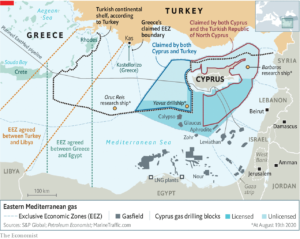In News
For centuries, Turkey and Greece have shared a chequered history. Greece won independence from modern Turkey’s precursor, the Ottoman Empire, in 1830. In 1923, the two countries exchanged their Muslim and Christian populations – a migration whose scale has only been surpassed in history by the Partition of India. The two nations continue to oppose each other on the decades-old Cyprus conflict, and on two occasions have almost gone to war over exploration rights in the Aegean Sea.
More About the Conflict
- The centuries-old Hagia Sophia, listed as a UNESCO World Heritage site, was originally a cathedral in the Byzantine Empire before it was turned into a mosque in 1453, when Constantinople fell to Sultan Mehmet II’s Ottoman forces. In the 1930s, however, Mustafa Kemal Ataturk, the founder of the Republic of Turkey, shut down the mosque and turned it into a museum in an attempt to make the country more secular.
- Many Greeks continue to revere the Hagia Sophia, and view it as a key part of Orthodox Christianity. So, when Turkish President Recep Tayyip Erdogan ordered the structure open to Muslim worship, tensions escalated.
- When Friday prayers were held at the Hagia Sophia for the first time in 90 years, church bells tolled across Greece in protest.
- Further, for 40 years, Turkey and Greece have disagreed over rights to the Eastern Mediterranean and the Aegean Sea, which covers significant oil and gas deposits.
- Both Turkey and Greece claim territorial waters in the Aegean reaching six nautical miles from their coasts. Turkey’s parliament in 1995 authorized the government to use military force if Greece expands its territorial waters to 12 nautical miles in the Aegean.
- On July 21, Turkey announced that the drilling ship Oruc Reis would be exploring a disputed part of the sea for oil and gas. Greece responded by placing its air force, navy and coastguard on high alert.
- Also, Turkey doesn’t recognize Greece’s claim that its territorial rights are determined by the location of its many islands, some of them just off Turkey’s shore. Rather it argues that a country’s continental shelf should be measured from its mainland. And Turkey hasn’t ratified the UN Convention on the Laws of Seas.
- The Mediterranean island Cyprus was effectively partitioned in 1963 when fighting erupted between its two main groups: Greek and Turkish Cypriots.
- It was fully divided in 1974 after Turkey intervened, capturing the northern third of the island, saying it intended to protect the minority Turkish Cypriots following an Athens-backed coup by supporters of union with Greece. That brought the two neighbors close to war.
- To this day, the Turkish Republic of Northern Cyprus is recognized only by Turkey, while the Republic of Cyprus, which is internationally recognized, officially has sovereignty over the entire island but is only able to govern in the south. Turkey doesn’t recognize the ROC.

















